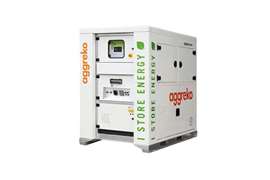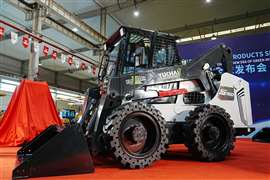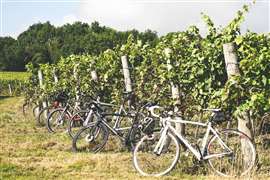Sunbelt Rentals UK reveals how it passed the Covid test
28 October 2021
Andy Wright, CEO of Sunbelt Rentals UK, talks to IRN’s Murray Pollok about ‘Project Unify’, the rebranding from A-Plant, and those massive Covid testing centre contracts.
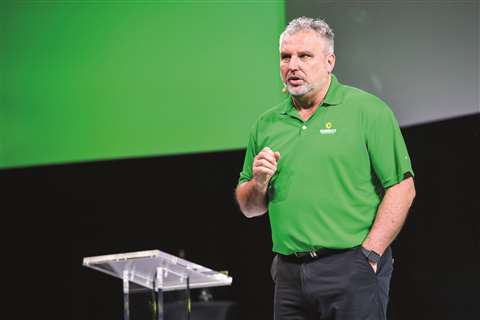 Andy Wright, CEO of Sunbelt Rentals UK, has a long career in rental with companies including Aggreko, Lavendon and Speedy. He joined A-Plant in 2019 and was appointed CEO in March 2020, just months before the rebrand to Sunbelt Rentals.
Andy Wright, CEO of Sunbelt Rentals UK, has a long career in rental with companies including Aggreko, Lavendon and Speedy. He joined A-Plant in 2019 and was appointed CEO in March 2020, just months before the rebrand to Sunbelt Rentals.
When Andy Wright was appointed CEO of A-Plant in March last year he was probably thinking about the challenges of the planned rebrand to Sunbelt Rentals UK just a few months later.
Of course, another challenge was heading his way – everyone’s way - just weeks after his promotion.
Speaking to IRN in September 2021, with the worst of the pandemic over, he can now afford to look back at a 2020 that turned out, from a business perspective, to be much more positive than he could possibly have hoped.
The health crisis impacted revenues, of course, but he says that by May last year most of the UK and Ireland depots were operating and that the business was continuing to service its ‘tier 1’ customers, many of whom operated throughout the lockdowns.
“It’s very difficult to build a strategy that insulates you from that”, says Wright, who joined Ashtead as COO of A-Plant in 2019 after high-profile roles with Aggreko, Lavendon and Speedy,
“And you’ve got some winners and losers within all of that. It depends on which sectors you’re serving. If you’re in the travel industry, there’s not a lot you can do to protect yourself in that sort of scenario.
“We absolutely saw ourselves as a critical service provider during that period, and we were anyway with the Covid sites”, he tells IRN.
How Sunbelt Rentals set up 500 Covid testing sites
That understated reference to Covid sites does not tell the full story, because Sunbelt – as it was rebranded in May 2020 to match its larger North American sister business – actually won around 80% of the contracts issued by the UK’s department of health to set up temporary testing centres around the country.
That eventually meant more than 500 locations, with Sunbelt providing temporary accommodation, power, lighting, traffic barriers as well as people to operate them.
It also meant that while other rental companies in Europe and North America were struggling with revenue falls, Sunbelt could report full-year sales in 2020 up 35% to £635 million (€745 million), with Covid-related work representing 29% of that.
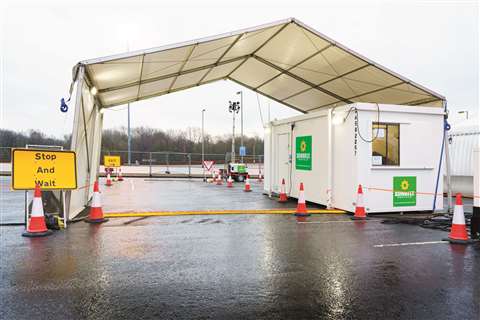 Sunbelt has supplied equipment to more than 500 Covid testing sites in the UK. These sites generated 29% of Sunbelt’s UK revenues in 2020/21.
Sunbelt has supplied equipment to more than 500 Covid testing sites in the UK. These sites generated 29% of Sunbelt’s UK revenues in 2020/21.
That qualifies as a remarkable success, especially for a CEO who had been in place for just weeks? How did they do it?
“There’d been a couple of attempts on a few testing sites where it had not gone particularly well. We got a call and were asked, could we come and do a centre down at Wembley? I think we surveyed it on Thursday, and we built it on the Friday in 12 hours.
“And I think the client just thought, well, they can do it. They said, try a few more, and so as time went by we got better access and it demonstrated the power of what we could do as an organisation.”
“[With our product range] we didn’t need to try and coordinate supply chains and partners. The vast majority of what we provided was our assets, serviced and delivered by our own teams.
“So, you know, I suppose in many respects it was the manifestation of our Project Unify strategy, creating a one team ethos. And the Sunbelt Rentals rebrand was part of that too.”
Most of these testing centres remain in place today, although some have changed location. How long will they be there? “We don’t know”, he answers.
He pays tribute to the staff who made it happen; “they went above and beyond, from the very start of this process. People were going out there and they’d be the only person staying in a hotel. There was a lockdown, and they were working long hours: finishing one site and then off to the next.
“At one point we were building 20 a week, which is phenomenal. People stepped up to the plate and almost put their lives on hold.”
Wright says the Covid centres have not just proven to be a good business, but highlighted the importance of taking a unified approach to its services, and also the opportunities to use the same process beyond the Covid centres.
The Rebranding of A-Plant
First, the unified approach. The change from A-Plant to Sunbelt Rentals in the UK was not simply a rebranding exercise, but part of a wider ‘Sunbelt 3.0’ project to align the US, Canadian and UK businesses.
In the UK, the rebranding will see the business attempt to grow by integrating 19 different business units – covering all the specialist division on surveying, power, access, etc. – under the same banner and to break down some of the silos that had built up over time.
“We’re a standalone UK business”, says Wright, “But we have got a joined up global strategy. The components of our strategy are the same across the UK, the US and Canada. But we’re applying them slightly different depending on the nature of the market.”
The UK operation is split into three areas: rental solutions, which covers the more traditional products, and then two specialist or engineering-type segments, called engineered solutions – involving both equipment and people, like temporary trackways – and specialist solutions business, like the recently established safety and communications business, or surveying.
“So, we’re splitting into the three areas. And we’ve got a slightly different approach to each of those….Rental solutions is 50% of our business. So, the rest is made up of the other two specialist divisions. Obviously, it’s much more asset intensive in rental solutions, whereas things like traffic management and not particularly asset intensive, but they are people intensive.
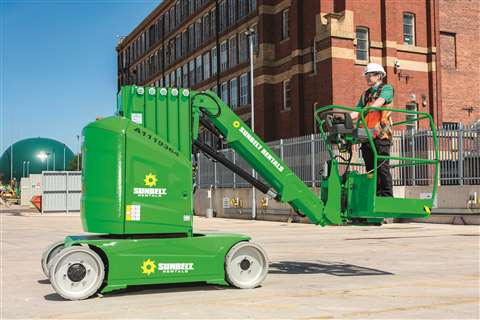 The rebranding from A-Plant to Sunbelt Rentals was completed during 2020.
The rebranding from A-Plant to Sunbelt Rentals was completed during 2020.
“We’ve got 19 different business units. Each of them different to each other but when you join them, they create something that’s very different to anything that’s there in the marketplace.”
Alongside the 19 business units there were actually 23 separate brands; “none of which - unless you knew – would you be aware that they belonged to the same organisation. So the idea was to create the umbrella brand, so that these businesses are all part of the same family, while retaining the individual specialisms.
“That’s important as people working in the company see themselves as lifting people, powered access people. It’s important to them that they feel like they’re part of a specialist business that.”
Customer trends
Has Sunbelt noticed that, as a result, customers are renting wider ranges of products than in the past? “We have, significantly”, he says, adding later; “That doesn’t happen overnight, but it appears to have happened pretty quickly.”
The focus on increasing sales of specialist equipment and services – ‘specialty rentals’ – is something that Ashtead is attempting also in North America, where growing the rental penetration of these special areas is seen as a key strategy.
The Covid projects in the UK have helped the company deliver that joined-up approach, and it has led Wright to push the same package concept to sectors beyond health; “I think the concept of mobilising a temporary infrastructure to help our customers to deliver their project, that applies to a lot of different sectors.
“Project management, estimating, providing almost consultant services that are best value, low CO2, safe, all of those areas that the client might do for themselves at the moment, they could leave that sort of stuff to people like us. That applies a number of sectors.”
For example, Sunbelt supplied a package of equipment for the G7 meeting in the UK in June and will also be very active at COP26 in Glasgow this October.
Sunbelt’s approach to its depot network
If structural change and Covid were not enough to be grappling with, Sunbelt is also facing – along with its peers - other challenges, such as supply chain shortages (equipment and labour), the ESG/sustainability agenda, the adoption of new technology, and a restructuring of its depot network.
On the network of 188 locations, there is likely to be a slightly new approach, with a spine of around 10 regional centres serving the smaller branches.
“Some of them are new centres that we’re building, some are existing centres that we’ve been able to procure additional land put close by. And probably 50% of our fleet will be held in these locations.”
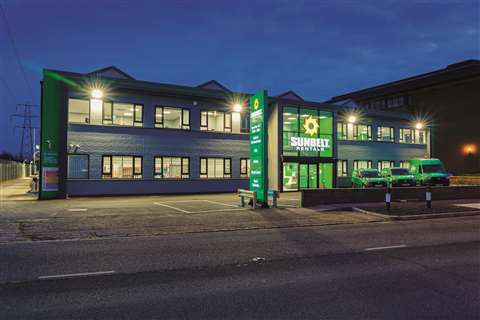 Sunbelt is streamlining its depot network, creating a spine of 10 or 11 large depots or hubs through the UK. This is hte company’s Heathrow location.
Sunbelt is streamlining its depot network, creating a spine of 10 or 11 large depots or hubs through the UK. This is hte company’s Heathrow location.
He says that starting with a clean sheet, having more than 180 locations might not be the preferred structure.
The key is scale; “Scale helps you to drive margin and obviously margin helps you to drive returns at the end of the day.
“So we are focusing parts of our business around developing real scale. A lot of that’s in the rental solutions area where we are trying to establish a spine of major centers that will incorporate all products and services and allow us to build scale in those locations, become more efficient.
How equipment fleet data can benefit both businesses and customers
That requirement from customers plays into the wider discussion around sustainability, CO2 emission and the use of data.
“We are absolutely focused on driving technology and the use of technology, within our business. We view every asset as a data capture device now. So, so we’re looking at how we can aggregate all the data from our assets - we have 20,000 assets.”
“And as time goes by, we’ll seek to get everything on that platform. My view is that we need to provide our customers with information that allows them to make better decisions about their business and the things that are important to them.
Data collection can be used both internally and for customers, of course, but Wright says it’s the customer impact that is his focus; “I think that if you build it in the right way, what’s good for your customer is probably good for you too.
“But my primary focus right now is on the customer side of things and making sure that we are supporting our customers in the right way to reduce costs, to reduce carbon, to operate to the service levels that are of the highest level.
“If a customer is committed to reduced CO2, for example, we are working really hard on our sustainable power provision where we are combining old technology generators with battery storage units, where we made a very significant investment in the last 12 months, £8 million pounds worth of investment.
Rental companies and the shift to sustainable construction equipment
As for the wider shift to more sustainable equipment, Wright says it is a complicated business, expensive and dependent on developments in technology and the wider infrastructure for the supply of electricity or hydrogen
“We’re at a crossroads: which technology is going to win? There’s lots of competing technology, whether it be solar or electric or hydrogen, or something else, which is why it’s difficult to know what to do, because you can place some big bets and get it wrong.
“There will be a change in technology, but there’s a lot of different things have got to happen in my view to make that happen.”
He says rental companies are caught in the middle between customers demanding sustainable machines and manufacturers who may not have the capacity or the settled technology required to build them.
“I think everybody’s got to win in that scenario. That’s why this collaboration is important to make this transition, because, ultimately, it’s the traditional, what we might call dirty technologies that are paying for the transition.
“We can’t transition everything overnight. It has to happen at a pace that customers, rental companies and manufacturers can handle.”
The other aspect is having the required infrastructure in place; “It doesn’t really matter what we build if we can’t charge it: if you’ve got electric excavators out in the field and you can’t drive it back to the charging station. We absolutely are determined to be at the front of this, and I believe that we already are.”
He says everyone is talking about hydrogen as the next great thing, but that could leave the equipment market needing both an electric and hydrogen supply infrastructure, and that will require investment.
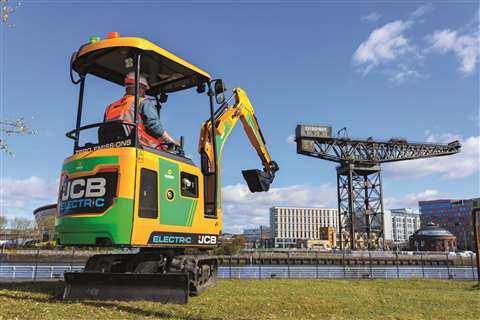 One of Sunbelt’s JCB electric mini excavators, pictured on the Clyde River in Glasgow, Scotland.
One of Sunbelt’s JCB electric mini excavators, pictured on the Clyde River in Glasgow, Scotland.
Sunbelt’s UK business place a €76 million order with JCB earlier this year, and 92% of that was sustainable, Stage V or electric. Half of its lighting tower fleet is solar hybrid or battery powered.
In terms of electric versions of mini-excavators or telehandlers, what is his view?
“I think the performance is good. I think the practicability is where the challenges of it are. How do I charge it out in the field? And what does it cost to provide a system to refuel them? I suppose that’s the challenge,” says Wright.
Digitalisation and the equipment rental sector
Technology, and digitalization, is another obvious area where the different Ashtead businesses can cooperate. “That’s the beauty of where we sit as a UK business”, says Wright.
“We’re part of a big group - the US is a very big animal. It’s investing significant amounts of money into technology solutions and we’re in a great place to benefit from that.”
One example is the use of AI for predictive maintenance of its fleet; “That’s absolutely an area that we’re investing in and looking at…I think in terms of the technology of the equipment or the technology around data, we’re just moving into a whole new area for the industry and that takes huge amounts of capital to make that transition…
“The technology exists, which is always a good starting point, but it does obviously require deep pockets to make it the best it can be.”
He makes the point that technology and processes will be localised; “We’ve got an opportunity to take a step change and become a market leading business in the sector from a technology perspective - that’s completely consistent.
“Is there a need to treat our rental businesses in the UK different to our rental businesses in the US, because we’re at different stages of our evolution and we have a different mix of products and services? Absolutely. So, there will be a localised strategy: similar concepts that are very much localised.”
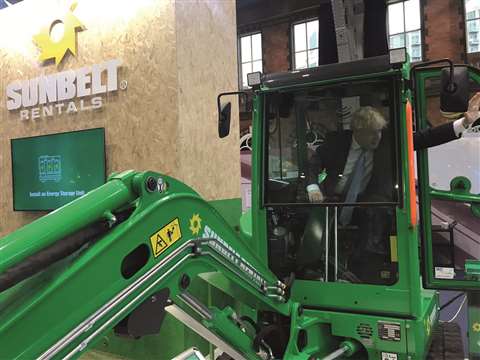 UK Prime Minister Boris Johnson visited Sunbelt Rentals UK’s stand as the recent Conservative Party annual conference. The company used the event to highlight its role in the UK’s infrastructure sector and its actions on sustainability.
UK Prime Minister Boris Johnson visited Sunbelt Rentals UK’s stand as the recent Conservative Party annual conference. The company used the event to highlight its role in the UK’s infrastructure sector and its actions on sustainability.
How supply chain issues have impacted Sunbelt
After a tumultuous 2020 and early 2021, Wright is now focused on making the mist of the recovery, despite supply chain challenges; “Yes, it’s the biggest issue right now, the supply chain and finding equipment…we’re probably forced to hold onto equipment longer than you probably would like to.
“And we were fortunate, we got in quite early in terms of placing orders, so we’re fortunate that we’re getting a steady stream of that equipment coming through.”
What about the much-publicised shortage of truck drivers?
It’s a problem, he says, but points out that the kind of work that rental drivers do - a more technical role involving varied locations and interaction with customers – is more attractive than the standard HGV driving job. “Some people really like that”, he says.
Rental market outlook
In terms of demand, he says the business is back to pre-Covid levels; “Infrastructure is obviously strong, very much government-backed.
“The mega projects take some time to get going. It could be a year’s time before you see any of that coming through into the P&L.
“The more commercial, speculative type of work, whether leisure or retail, those are obviously still not what they were. Some industrial construction, distribution centers, big warehouses, that’s pretty good still. I think that will remain good for some time.”
He has other ‘big picture’ things to consider. The UK business is making significantly lower returns than its North American sister.
Wright on equipment rental pricesRental companies often complain about prices, but for Andy Wright, what makes the current moment different, and worse, is that in addition to general price inflation, OEMs are increasing prices and there is the additional challenge of higher costs of hybrid/electric machines. “I think it’s getting worse, and I don’t think that’s a sustainable business model for the rental industry”, he says, “You don’t need to be a Harvard business graduate to work it out. I think it’s a big problem and we have to find a way to do that better. “There has to be something in it for everybody, [rental companies, OEMs, end customers]… I think the structure of the rental market is a challenge. The rental market has a range of people that are running their business for different reasons. Some people have their livelihoods on the line and smaller rental businesses.” In terms of charging higher rental rates for electric or hybrid machines – which are more expensive than traditional models - Wright says, “we’re working really hard to try and do that.” “The technology shift will happen. It’s about recognising that there’s some commercial forces at play here and people need to make returns.” |
That has long been a feature of the wider rental markets in Europe and North America, with higher pricing in North America the envy of European operators.
Wright simply says there is room for improvement and that “there’s no reason why they can’t make satisfactory returns.”
That is clearly the purpose of the various initiatives: the integration of the different businesses, the removal of ‘silos’, cross selling, streamlining the depot network, plus investment in technology.
What about acquisitions and a large scale move into continental Europe? (It already operates temporary trackway rental businesses in Germany and France, with two locations in each.)
Business growth strategy
On acquisitions, he says “you never say never, but I think I’ve made it clear that, right now, we’re focused on an organic strategy.
“Acquisitions are difficult in the UK market. It hasn’t been a fundamental part of the strategy previously and right now, for me, it’s not something that I’m particularly focused on.”
In terms of building a business in Europe, he says they have enough going on in the UK and Ireland; “We’ve strengthened our business in Ireland - we’ve got Belfast and Dublin locations. And we operate in Germany and France, but I think to try and do more than that at this stage would be a distraction. I think there’s lots we need to do in the UK.”
That may the public position, but there is no doubt that Ashtead will be weighing up the opportunities in Europe and watching how Loxam and Boels develop, as well as United Rentals, which now of course has its own European operations.
Still, given the challenges – and successes - of last 18 months, you can understand Wright’s focus on the UK and Ireland. The change from A-Plant to Sunbelt Rentals UK was part of a wider strategic shift, and that’s going to keep him busy for a while yet.




